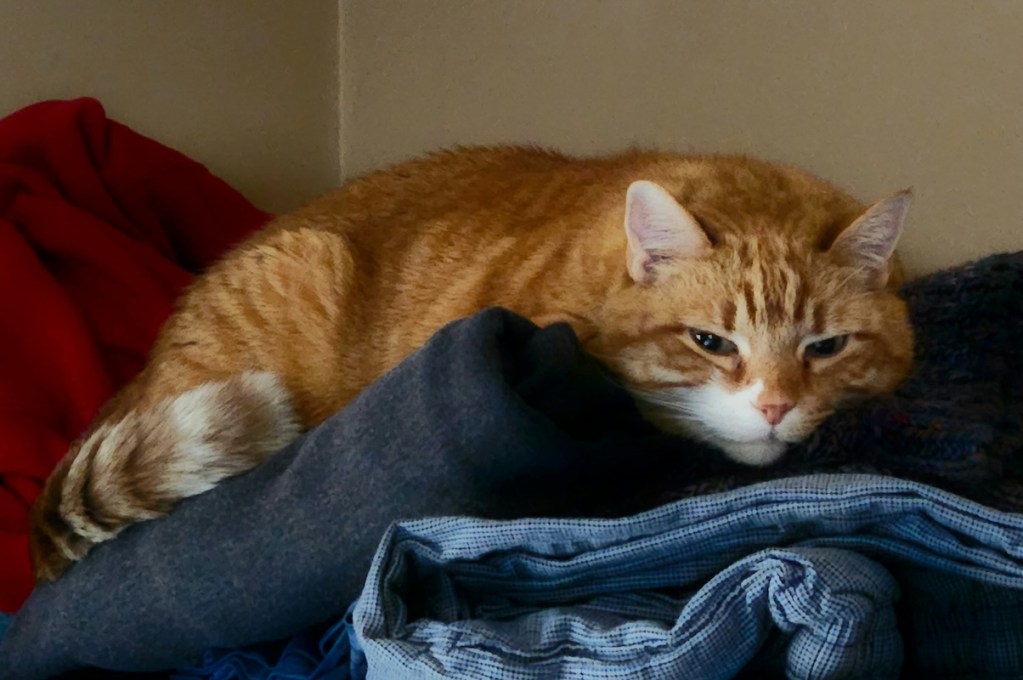Cats have many reputations — for plotting your demise (probably not), destroying the holiday trees (fair), and night owl behavior (they can’t help themselves). However, cats are also known for being good about using the correct facility. Their instinct to go in one gives kitties a point over dogs, which are generally more difficult to housebreak in cat lovers’ books.
Yet, your cat is suddenly peeing on your clothes.
“Why does my cat pee on my clothes?” you ask. That’s a good question, and the answer is critical to uncover. Here’s why: Peeing outside of the litter box is a sign that something is up, especially if the cat usually uses one like a pro. So, what’s up with kitty when they’re peeing on your laundry? They’re not trying to spite you, but instead, to send you a rather gross but important message. Here’s what a cat is saying when they choose your favorite shirt over their box.
Why does my cat pee on my clothes?

The answer depends and is best left to a vet. Cats are typically good about peeing in their litter box, and urinating on laundry is abnormal. Generally, the reason a cat is peeing on your clothes is medical, behavioral, or related to their litter box. The cat may also have accidents for a combination of these, which are admittedly broad. Let’s narrow down even further potential reasons why kitty pees on your laundry.
Medical
The most significant reason why sudden peeing outside the litter box should warrant a vet trip is that the behavior could be a flag of an underlying condition. Some are minor (but not fun), while others are more serious. These conditions include:
- Urinary tract infection (UTI). Like humans, cats can develop UTIs if the bladder or urethra becomes infected by bacteria. Since UTIs cause pain and increase feelings of urgency when a cat needs to pee, they may resort to the comfort of your soft laundry.
- Feline lower urinary tract disease (FLUTD). This term refers to a group of lower urinary tract conditions that can be painful for cats. Sometimes, a cat’s urethra can become blocked or inflamed, which only exacerbates pain.
- Kidney disease. Cats with kidney disease are typically thirstier and need to urinate more frequently. If your laundry basket is closer, your kitty may go there instead.
- Diabetes. Like kidney disease, cats with diabetes may hit the water dish and need to eliminate more frequently.
Behavioral
Notably, “behavioral” issues don’t mean your cat is “bad.” Unfortunately, peeing outside the litter box is a common reason cats get turned into shelters. However, some insights on what triggers these behavioral issues may help you show your pet some empathy and seek help for them.
Cats are famously territorial and use pee to indicate a space is theirs. Why? Evolution. Modern cats are closely related to wild kitties that love the great outdoors. While indoors is the safest space for a domestic cat these days, your pet may not know that. Being inside may make them bored and anxious.
Also, changes to their routine, like a new baby, pet, home, or work start time for you, may throw them off and stress them out or leave them feeling like they have to pee to mark territory. Loud, sudden noises may also frighten a mouser and send them scurrying for the nearest place to pee, which happens to be your laundry.
Remember, cats aren’t capable of spite — they’re simply trying to tell you they’re stressed.
Litter box
Kitties are notoriously picky, and your cat may not like their litter box. Did you recently change the texture? Perhaps they prefer unscented litter, even if you respectfully disagree? Maybe the cover isn’t their jam, or are they telling you to clean their box more often? Is the box too small? These are questions to ask yourself (but not instead of going to the vet to rule out medical issues).
What to do if your cat is peeing on your clothes

You want to get to the bottom of the reason for the sake of your cat and wardrobe. Here’s what to do:
- See a vet. Your vet can run bloodwork and scans and perform a physical exam to rule out medical conditions. If a medical condition is diagnosed, the vet will discuss treatment options, like medications to treat infections or diabetes.
- Litter box trial and error. Ensure the litter box is somewhere quiet where your cat can be alone to do their business. Ensure your pet can comfortably turn around in the box. You may need to experiment with different styles of boxes and litter.
- Enrichment. If your furry friend is bored, providing them with plenty of toys to engage with can redirect their attention.
- Pet behaviorist. If a behavioral issue is suspected and toys aren’t helping, a specialist can help you work with your cat.
- Keep your laundry out of reach. As you work through your kitty’s issue, ensure they can’t access the laundry. That’ll at least save your favorite shirt.
Closing thoughts

If your cat is peeing on your laundry, call the vet. Cats typically prefer to go in their litter box. Something is up when cats urinate outside the box—on your laundry or elsewhere. Reasons can vary for medical, behavioral, or litter box issues. Sometimes, more than one of these may influence your cat’s new potty habits.
Step one is ruling out or treating underlying medical conditions. A pet behaviorist can help you with issues like stress and anxiety. Keeping the litter box clean and ensuring your cat can comfortably turn around in it can go a long way toward ensuring they’re inclined to use the proper facility.




